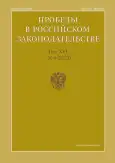Protection of the Rights of Consumers of Financial Services (on the Example of Derivative Financial Instruments)
- Authors: Krokhina Y.A.1
-
Affiliations:
- Lomonosov Moscow State University
- Issue: Vol 16, No 6 (2023)
- Pages: 34-40
- Section: Public Law (State Law) Sciences
- URL: https://bakhtiniada.ru/2072-3164/article/view/232128
- EDN: https://elibrary.ru/VXNGKM
- ID: 232128
Cite item
Abstract
Derivative financial instruments are used by financial market participants both for the purpose of hedging risks and for speculative interest. In recent yearsn residents have increased their interest in derivatives transactions, which are used as an alternative to foreign investment products, as well as to circumvent economic sanctions. By economic nature, a derivative is a complex and high-risk financial instrument, the legal regulation of which is imperfect. These circumstances give rise to a large number of violations of the rights of consumers of financial services. The standard for protecting the rights of consumers of financial services requires the Bank of Russia to take proactive measures aimed at preventing violations and restoring the violated rights of participants in transactions with derivative financial instruments. The implementation of these powers of the regulator is difficult due to the large number of regulations of various levels that regulate differentiated sectors of the financial market. Reasoned proposals to improve the efficiency of the standard for protecting the rights of consumers of financial services.
Full Text
##article.viewOnOriginalSite##About the authors
Yuliya A. Krokhina
Lomonosov Moscow State University
Author for correspondence.
Email: jkrokhina@mail.ru
ORCID iD: 0000-0001-9178-758X
SPIN-code: 3526-8230
Dr.Sci.(Law), Professor, Head of the Department of Legal Disciplines of the Higher School of Public Audit (Faculty)
Russian Federation, MoscowReferences
- Andrew McCollum. ETFs: U.S. Institutions' New Tool of Choice for Portfolio Construction // Coalition Greenwich. 2019.
- Boyle P., McDougall J. Trading and Pricing Financial Derivatives: a Guide to Futures, Options, and Swaps. – 2nd ed. – Boston/Berlin : Published by Walter de Gruyter Inc., 2018; Hull J. Options, Futures, and Other Derivatives. – 9th ed. – Toronto : University of Toronto, 2018.
- Derivatives statistics // Bank for International Settlements, 2022. - [Electronic resource]. – Access mode: https://stats.bis.org/statx/toc/DER.html (accessed 10.07.2023).
- Exchange Volume Reports // Futures Industry Association, 2022. - [Electronic resource]. – Access mode: https://www.fia.org/etd-volume-reports (accessed 10.07.2023).
- Largest derivatives exchanges worldwide in 2020 and 2021, by number of contracts traded // Statista, 2022. – [Electronic resource]. – Access mode: https://www.statista.com/statistics/272832/largest-international-futures-exchanges-by-numberof-contracts-traded/ (Accessed 10.07.2023).
- Apalikov N. S. To the question of the functions of derivatives in the Russian Federation // Bulletin of the Moscow University of the Ministry of Internal Affairs of Russia. 2022. No. 6. P. 23–25.
- Boychenko I.I., Lyandau Yu.V. The use of options and futures as tools for increasing capital in the digital economy // Vestnik REU im. G. V. Plekhanov. 2021. Volume 18. No. 6 (120). pp. 17 - 25.
- Boltanova Elena Sergeevna. Derivative financial instruments: development of Russian legislation // Vestn. Volume. state university 2019. No. 444. P. 257-262.
- Vorob'eva A.A., Gerasimov V.V., Li Yu.V. Algorithm for detecting leaks of insider information of financial markets in investment consulting // Scientific and technical bulletin of information technologies, mechanics and optics, 2021, volume 21, no. 3. P. 394 - 400.
- Holmsten A.Kh. Essays on Russian commercial law. SPb.: Type. D.V. Chichinadze, 1895. Issue. 1.
- Gorlovskaya I.G. Financial policy regarding the categorization of investors - individuals in Russia and the area of protection of their interests.// Bulletin of the Omsk University. Series "Economics". 2020. V. 18. No. 4. P. 19-36.
- Ivanov D.D. Analysis of market trends in precious metals derivatives // Journal of Economy and Business, vol. 4-1 (86), 2022. P. 172 - 179.
- Kondratiev D.L. How the stock exchange was built in Russia. M. : MICEX, 2001. - p. 123.
- Naydenova N.V. Evolution and trends in the development of the global monetary and financial system. Bulletin of the Saratov University. New episode. Series: Economy. Control. Right. 2023. Vol. 23, no. 2. P. 153–162.
- Determination of the Constitutional Court of the Russian Federation of December 16, 2002 N 282-O “On termination of proceedings in the case of checking the constitutionality of Article 1062 of the Civil Code of the Russian Federation in connection with the complaint of the commercial joint-stock bank Bank Societe Generale Vostok”// Bulletin of the Constitutional Court of the Russian Federation. 2003. N 1.
- Pobedonostsev K.P. Civil law course. M.: Zertsalo, 2003. Vol. 3.
- Resolution of the Constitutional Court of the Russian Federation of July 9, 2021 N 34-P “On the case of checking the constitutionality of part 1 of article 15.25 and paragraph 2 of part 1 of article 25.11 of the Code of Administrative Offenses of the Russian Federation, paragraph 6 of part 1 of article 1, parts 4 and 5 of article 12 of the Federal law “On currency regulation and currency control”, as well as part 2 of the article 2 of the Federal Law “On Amendments to the Federal Law “On Currency Regulation and Currency Control” in connection with the complaint of citizen N.V. Kuznetsov.
- Ruchkina G.F. Countering the misuse of insider information and market manipulation: experience of the Bank of Russia // Banking Law. 2019. No. 1. P. 9 - 22.
- Shershenevich G.F. Commercial law course. M.: Statute, 2003. T. 2.
- Eyeberdiev Gurbanberdi. International financial markets: formation and features of functioning // Сeteris paribus. 2023. No. 5. P. 87-89.
Supplementary files








